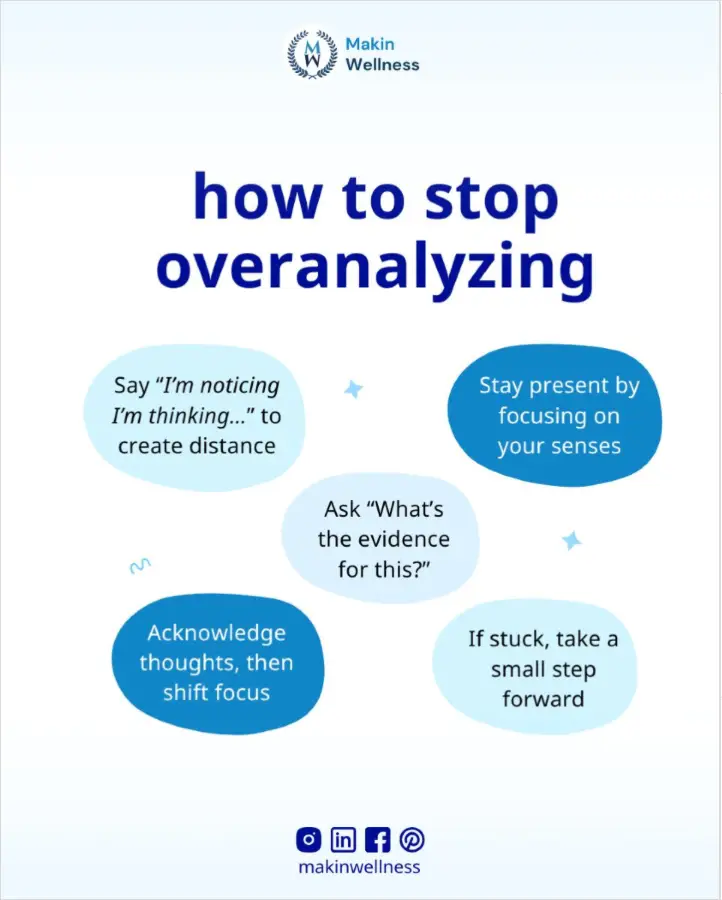Overanalyzing means disproportionately focusing on a situation, problem, or idea to the point where you are distressed and fixating on:
- examining every detail,
- obsessing over social cues where there may not be any, or looking for specific nuances, or
- infinitely replaying scenarios in your head.
Some of the signs of overanalyzing can look like:
- thoughts keeping you up at night,
- reading too much into texts or comments,
- uncontrollable racing thoughts,
- repetitive thoughts,
- excessive self-doubt, and
- perfectionism.

Here are 10 Suggestions on How to Stop Overanalyzing:
1. Distract Yourself
Distracting yourself by intentionally breathing (count four seconds each as you inhale, hold your breath, and exhale), or getting up and moving around can help to interrupt constant thoughts and bring you back to the present. In breaking the repetitiveness of your thoughts, this may allow you to stop and reset your thinking toward positive or productive things.

2. Challenge Your Unhealthy Thoughts
If you find yourself often focusing on unhealthy thoughts or thought patterns, you may want to practice focusing on something positive within that situation or problem. You can also think about something unrelated that is positive. This can help you see beyond what you are overanalyzing.
3. Focus Less on the Past
The things you go through in life certainly have an impact on you, and those can be positive or negative. Over engaging with negative events from your past can make it difficult to move beyond those hurts. Further, focusing more on the present and the future can help disrupt those negative thoughts about the past.

4. Journal
While not everyone is a writer, you don’t have to be one to journal. The main idea of journaling is to get your feelings out and onto paper. That can be through writing, drawing, painting, or any other creative outlet. Letting your emotions out can allow you to see them more objectively, which can in turn help you address them.
5. Avoid Catastrophizing
Catastrophizing: a big word with an even bigger personality. This is where you go right to the worst-case scenario when thinking about problems or situations. When you find yourself doing this, you can add some balance into the equation by considering less overwhelming options. If you can’t get past this on your own, consider asking a friend or therapist to help you think of something.
6. Find Ways to Create Closure
Some things that happen to us leave us without a sense of everything being neatly wrapped up and ended. If you have a situation that has left you hanging, contemplate finding your own way to provide closure to the event. What you do may or may not make sense to others, but the important thing is that you may obtain closure and perhaps that can help you move on from what happened.

7. Work on Improving Your Interpersonal Skills
There are times when overanalyzing comes from doing or saying something that makes you feel stupid or foolish. You can replay those events over and over in your head, which can lead to avoidance of situations where that could happen again.
One way to improve your interpersonal skills is to join a club or find a group activity that you enjoy. This allows you to interact with people who have similar interests and it may help you feel more relaxed when speaking with other people.
8. Focus More on Progress than Perfection
Perfection doesn’t exist. However, there are many people who find themselves in the endless pursuit of it. Sticking to perfectionist tendencies can easily cause you to overanalyze every place you feel you are not measuring up. Shifting your focus to one of making small but meaningful progress gives you achievable goals to meet rather than excessively lofty ones that are demoralizing and unattainable.
9. Pursue Contentment
Teddy Roosevelt once said, “comparison is the thief of joy.” Constantly comparing where you are versus where others are, or where you think you should be, sucks the life out of your day to day. It causes you to be so focused on tomorrow that you miss the opportunities for contentment in the present. Choosing contentment can allow you to take a breath and see how far you’ve actually come and then refocus for the future.
10. Talk Things Out
Sometimes you can use suggestions like these to help reduce your overanalyzing, and sometimes you need a little more help. Working with a therapist who is trained in cognitive behavioral therapy (CBT) is a proven way to rein in overanalyzing.
Cognitive behavioral therapy (CBT) focuses on changing thinking and behavioral patterns. Therapists who use this technique can help you to handle day to day life better, which is one way to learn how to stop overanalyzing.
Learn How to Stop Overanalyzing with Makin Wellness
Acknowledging that you overanalyze is the first step toward learning how to manage your thoughts. Knowing that there is help for you can start the process of easing your anxiety.
There are many options when it comes to getting help. You may want to consider online therapy with Makin Wellness. We can match you with a therapist you can meet with in the comfort of your own private space.
Online therapy gives you a private, consistent space to:
- Learn about overanalyzing;
- Practice CBT with professional guidance;
- Build practical coping tools; and
- Set goals that reflect your values.
You deserve to feel empowered in your mental health journey. Your Makin Wellness therapist is here to help when you’re ready. If you are unsure whether this kind of treatment is right for you, don’t worry, your therapist can help answer any questions you have about the overanalyzing symptoms you are experiencing. Call us at (833)-274-heal or click here to schedule an appointment with one of our caring online therapists today.








